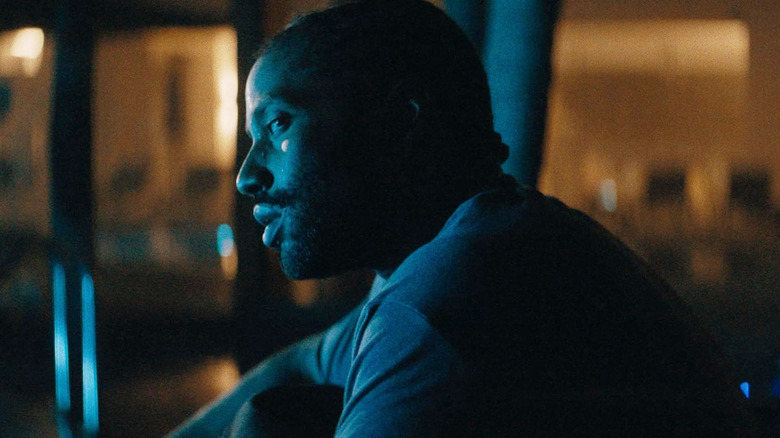The Creator's Box Office Failure Says A Lot About The State Of Sci-Fi Cinema
Director Gareth Edwards returned after a nearly seven-year absence with his original sci-fi film "The Creator" over the weekend. It was his first movie since 2016's $1 billion hit "Rogue One: A Star Wars Story," which was his second hit franchise blockbuster in a row following 2014's "Godzilla." Unfortunately, it looks like his attempt to make a massive-scale sci-fi film outside the confines of established IP isn't going to pan out, as Edwards' latest was a big letdown on opening weekend.
"The Creator" faced heavy competition as both "Saw X" and "Paw Patrol: The Mighty Movie" also opened over the weekend, with "Dumb Money" additionally expanding after a few weeks in limited release. In the end, "Paw Patrol" took the top spot with a $23 million haul, while "Saw X" also had a very solid debut with $18.3 million. Sadly, that left Edwards' latest, which hails from Disney's 20th Century Studios, settling for third place with $14 million, per The Numbers. The decent news is that the film performed better overseas, taking in $18.3 million internationally for a $32.3 million global debut.
Edwards was shockingly thrifty for a movie of this scale, with the budget coming in at $80 million. Be that as it may, Disney surely wanted a lot more with this level of investment. The studio probably needs it to pull in around $200 million worldwide on the low end to break even, and, at this rate, the movie simply won't get there. Barring a remarkable turnaround or legendarily good legs, this experiment is going to be a relative failure. That's a damn shame since Disney and other studios will undoubtedly be hesitant to pull the trigger on similar, large-scale original sci-fi in the near future given what happened here.
A franchise-dominated genre
Two things are true at once: sci-fi is the most popular genre at the box office right now and the genre is dominated by franchises. From superhero movies to the MonsterVerse that Edwards helped to start with "Godzilla" nearly a decade ago, franchise sci-fi regularly tops the charts. This year we've got "Guardians of the Galaxy Vol. 3" ($845.5 million) and "Spider-Man: Across the Spider-Verse" ($689.9 million) as the number four and number six highest-grossing films of the year, respectively, with "Ant-Man and the Wasp: Quantumania" ($476 million) still sitting in the top 10.
2022 was far more dominant in this department as five of the top 10 movies of the year, led by the record-breaking "Avatar: The Way of Water" ($2.32 billion), were sci-fi sequels. Over the last 15 years or so, the global charts have more or less looked the same by year's end. That's the way it has been and, by the looks of things, the way it will continue to be.
That's not to say original sci-fi never pans out. "Free Guy" earned $331 million worldwide in a Covid-hampered 2021 against a $100 million budget, for example. But that's the exception and not the rule. Other somewhat recent examples of big-budget sci-fi not panning out include Neill Blomkamp's "Chappie," which earned just $105 million worldwide against a $49 million budget after opening to $13.3 million domestically. There's also Brad Pitt's "Ad Astra," which cost $90 million to produce and topped out at $127.4 million worldwide after posting a $19 million opening.
There hasn't really been much big-budget original sci-fi to speak of in the aftermath of the Covid lockdowns. "The Creator" had to shoulder that weight and audiences just weren't all that interested, it pains me to say. The crowded release date certainly didn't help matters any, though.
Make it cheap or don't make it at all
Generally, low-budget sci-fi is what has the chance to break out when it comes to originals. Just look at "M3GAN" earlier this year, which finished with $180 million globally against a $12 million budget. Granted, that one had the benefit of playing for the horror crowd as well. We've also got recent Best Picture Oscar winner "Everything Everywhere All at Once," which pulled in $141 million against a $25 million budget. At a certain point, it just gets incredibly difficult to put butts in the seats.
Even if we look at many of the big sci-fi franchises out there, they come from relatively humble beginnings. George Lucas had to fight tooth and nail to get "Star Wars" made with a budget of just $11 million in 1977, which would be around $55 million in today's dollars. And for years Marvel had an impossible time turning its superheroes into successful films, with 1998's "Blade" getting the ball rolling. That was an R-rated, horror-skewing flick that was made for $45 million on its way to $131 million worldwide. That, in turn, paved the way for "X-Men" and, more importantly, Sam Raimi's "Spider-Man."
It's a real shame that Edwards tried to show the industry at large that blockbuster filmmaking can be done more affordably which, optimistically, could have paved the way for more original, larger-scale films. Who knows? Maybe it still will. Maybe it will also have an impact on franchise films as well, bringing the costs down at a time when so many budgets are downright out of control. This movie may well still have a positive impact on the industry. It's just too bad Edwards' movie won't be rewarded for paving the way, nor will Disney benefit from taking an admirable gamble.
"The Creator" is in theaters now.


